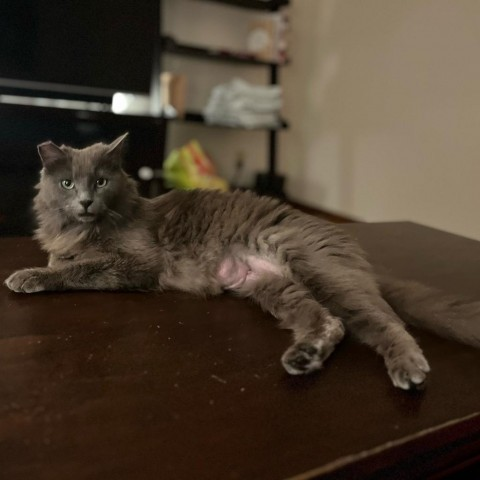Excitement at the Cat Sanctuary: A possum Silver-cat thought she had tamed and trained properly shows an ugly side, threatening to eat Pastel's kittens. His behavior is abnormal. Possums usually move slowly, running only for their lives, but this one has been running laps around the house, hissing at anyone he meets, not responding even when Silver slapped him. He may have to be euthanized, and cremated if he dies all by himself, poor little fellow.
So the kittens and Pastel have been schlepped in at night and out in the morning. There are four kittens, all white with pastel grey and beige spots above. Well, one has both grey and beige spots, two have grey, and one has beige. They still spend most of the time sleeping, and have apparently learned to scratch at the side of their nest box, instead of mewing, to call their mother's attention. So far the calico kitten has opened one eye and hissed at me; the others, who look as if they may be male, have that experience still ahead of them. Serena says, if anyone wants to adopt these kittens before they're three months old, they have to take the whole boxful including Pastel. (Serena is not pleased with the amount of attention Pastel and the kittens have attracted.)
That, and then Microsoft has STOLEN a few hours of computer time again. All computer owners need to be documenting the amount of time STOLEN by "updates" from Microsoft, Google, Amazon, any other major service providers you use, preparatory to a lawsuit for payment for the waste of paid time and privately owned computers. These companies want to play with computers when they take a whim into their heads, they need to be making those computers available free of charge to us and paying us for the time we spend waiting to finish what we were doing.
Gross-Out
The World Economic Fund continue to congratulate themselves on having "contained the spread of COVID." Tell that to someone whose parents died of vaccine reactions, y'smug bunghole!
Just to clear your head, after watching that, you might want to give a listen to Naomi Wolf, who manages to show empathy for the plain people of western Europe whose lives are even more endangered by these Euro-maniacs.
Music
Does anyone else remember Joan Aiken's short story "Hope"? In which the music teacher gets lost in London and meets the Devil conducting a skinny, dreary-looking, sad-sounding pop band in an alley? I believe this may be the group, possibly even the song, Joan Aiken had in mind.
Phenology
Lots of pretty things, but what's seldom captured in a photo is the green "breeding patch" on the face of the egret.
















